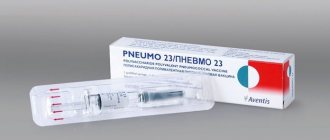Vaccination Center Inpromed
Sovigripp
Sovigripp
from 1000 rub.
Manufacturer Russia
Age For children from 6 months to 3 years, Sovigripp is administered twice with an interval of 4 weeks at a dose of 0.25 ml (1/2 dose). For children over 3 years of age and adults, Sovigripp is administered once at a dose of 0.5 ml.
Packaging0.5 ml
Flu vaccination is an effective way to protect against severe complications. The use of the drug Sovigripp reduces the risk of morbidity in adults and children; it is recommended for seasonal prevention. The highly purified composition is characterized by rare side effects and has a number of features when used.
Compound
The drug is effective against several common strains of influenza and contains hemagglutin of the following subtypes of the virus:
- A(H1N1) - 5 µg;
- type B - 11 µg;
- A(H3N2) - 5 µg.
Prescribed to prevent influenza infection during colds for children over 6 months, adults and the elderly. The composition includes auxiliary components that are necessary to maintain the activity of the non-magglutin virus: potassium dihydrogen phosphate, adjuvant SOVIDON, phosphate-saline solution. The manufacturer uses thiomersal as a preservative.
Which vaccine is suitable for children?
Both one and the other vaccines are completely identical. Regular monitoring by Roszdravnadzor allows us to cast aside all doubts about their safety. Therefore, both products are ideal for immunizing children.
Every year, changes occur in the composition of medications, which improves their quality and effectiveness in preventing influenza.
Everyone needs to be vaccinated - children and adults. The drugs have no toxic effects, so immunization is not prohibited during pregnancy. It is impossible to fully judge the effectiveness of the vaccine. Experts recommend getting vaccinated every year to prevent infection and complications during a flu epidemic.
Indications
The flu vaccine Sovigripp is prescribed as an effective preventive measure. Used annually during routine vaccination in the following groups of patients:
- children from 6 months without adding a preservative;
- patients over 18 years of age without age restrictions with a composition with the addition of thiomersal.
The main groups of people with indications for vaccination with Sovigripp:
- elderly – over 60 years old;
- patients suffering from chronic pathologies of the cardiovascular, endocrine, nervous systems, renal dysfunction, diabetes mellitus, metabolic disorders, severe anemia;
- patients with HIV, hepatitis, allergies;
- schoolchildren, students in a group, high-risk zone;
- children with weakened immune systems who often suffer from acute respiratory viral infections.
Sovigripp is recommended as protection against infection for people who, in the course of their daily work, come into contact with potential carriers of influenza. These include workers in medical, preschool and school institutions, food services, consumer services, and public passenger transportation. Vaccination reduces the incidence rate among military personnel, full-time students, elderly people living in a nursing home, or a sanatorium.
Which is better - Grippol plus or Sovigripp
There is no particular difference between the Grippol Plus and Sovigripp vaccines. Taking into account all the above information, we can conclude that pharmacological agents have a similar composition and side effects.
Both drugs are made in Russia, have a high degree of purification and fully comply with medical criteria.
The cost of a single dose of Sovigrippa is 200-250 rubles. The price of Grippol Plus is 2 times higher for a similar dosage and equals 430 rubles.
According to reviews, patients prefer the Sovigripp vaccine, noting its high effectiveness. Comparing the two drugs, Grippol plus is somewhat inferior to Sovigripp in quality and price.
Contraindications
The drug Sovigripp is not recommended for patients with chicken protein intolerance or a severe allergic reaction to the active components in the vaccine. Among the main contraindications indicated by the manufacturer:
- pregnancy at any stage (in rare cases, vaccination with a composition without a preservative is allowed);
- a history of severe reactions to vaccinations with fever, swelling, the formation of a focus of hyperemia, coma or muscle cramps;
- child's age up to 6 months.
There are contraindications for which vaccination is not recommended until exacerbations are eliminated:
- acute stage of ARVI, rhinitis, seasonal allergies;
- intestinal infections;
- exacerbation of chronic pathologies, which is accompanied by changes in blood counts, chills, abnormal stool, and high fever;
- oncological diseases during active therapy (administration of the vaccine during remission is allowed).
In such situations, vaccination can be done as prescribed by a doctor after the acute symptoms disappear.
Annual vaccinations against seasonal influenza significantly reduce morbidity and mortality in all age groups. The goal of vaccination is not to completely eliminate influenza as an infection, but to reduce morbidity and mortality from influenza and, especially, from its complications, from exacerbation and aggravation of cardiovascular, pulmonary diseases and other chronic pathologies.
Flu vaccines: what are they?
Every year, doctors recommend different drugs for vaccination. The fact is that influenza viruses change every season, and the composition of vaccines, accordingly, also needs to be changed.
There are two main types of influenza vaccines - live and inactivated. A live vaccine contains live viruses in a weakened state - they are called strains. The administration of live vaccines is often accompanied by side effects, so they are not currently included in prevention campaigns.
Inactivated vaccines do not contain live viruses. These drugs are characterized by high quality of purification - there are very few or practically no toxic impurities that are usually found in live vaccines. When inactivated influenza viruses are introduced into the body, the production of antibodies is activated, that is, exactly the same natural defense mechanisms are launched that are activated upon contact with living microorganisms.
We strongly advise you to consult a specialist who will recommend the vaccine most suitable for your body. No one can guarantee 100% that a vaccinated person will not get the flu, but it is 90% sure. And this is a serious argument to think about.
Vaccine "Sovigripp"
For active annual preventive immunization against seasonal influenza, the Sovigripp vaccine without a preservative is used in children from 6 months of age, adolescents and adults without any age limit, and in pregnant women in the II-III trimester of pregnancy; vaccine with 2 preservatives - in adults over 18 years of age.
“Sovigripp” is an effective and safe flu vaccine that has passed preclinical and clinical trials, confirming its high quality, which is not inferior to foreign analogues.
Benefits of the SOVIGRIPP vaccine
An effective and safe drug for the prevention of influenza, which has passed preclinical and clinical trials, confirming its high quality, which is not inferior to foreign analogues.
Sovigrippa contains the modern adjuvant Sovidon, which has immunomodulatory, detoxifying, antioxidant and membrane-protective properties.
Studies have shown that the drug has virtually no toxicity and pyrogenicity (increase in body temperature).
The ready-made dosage of Sovigrippa is as convenient as possible even for people without special medical knowledge.
Contraindications for use
1. Allergic reactions to chicken protein or other components of the vaccine.
2. Severe post-vaccination reactions (temperature above 40 °C, the appearance of edema at the site of vaccine administration, hyperemia over 8 cm in diameter) or post-vaccination complications (collapse, non-febrile convulsions, anaphylaxis) to the previous administration of influenza vaccine.
3. Pregnancy (when using a vaccine with a preservative).
4. Age up to 18 years (when using a vaccine with a preservative).
5. Age up to 6 months.
Temporary contraindications
1. Acute febrile conditions, acute infectious and non-infectious diseases, including the period of convalescence. Vaccination is usually carried out 2-4 weeks after recovery.
2. Chronic diseases in the acute stage. Vaccination is carried out during the period of remission. The possibility of vaccination of persons suffering from chronic diseases is determined by the attending physician, based on the patient’s condition.
3. For mild forms of acute respiratory viral and intestinal infections, vaccination is carried out after the temperature has normalized and/or the acute symptoms of the disease have disappeared.
Directions for use and doses
Vaccination is carried out annually in the autumn-winter period.
Vaccination is possible at the beginning of an epidemic rise in the incidence of influenza.
For children over 3 years of age, adolescents and adults without age restrictions, the vaccine is administered once intramuscularly into the upper third of the outer surface of the shoulder (in the area of the deltoid muscle) in a vaccination dose of 0.5 ml.
For children from 6 months to 3 years, the vaccine is administered twice with an interval of 4 weeks into the anterior outer surface of the thigh intramuscularly in a vaccination dose of 0.25 ml (1/2 dose) according to the administration schedule.
Precautions for use
- Do not administer intravenously!
- On the day of vaccination, those vaccinated must be examined by a therapist/paramedic with mandatory thermometry. At temperatures above 37 °C, vaccination is not carried out.
- Vaccination sites must be equipped with anti-shock therapy. The vaccinated person must be under medical supervision for 30 minutes after administration of the drug.
"Sovigrip." Questions and answers
Is it possible to vaccinate children with the Sovigripp vaccine? From what age?
Yes, you can. The Sovigripp vaccine is used for active annual preventive immunization against seasonal influenza in children from 6 months of age. In children from 6 months to 18 years of age and pregnant women, the vaccine is used without a preservative.
How do you know which vaccine is being administered, with or without a preservative?
All information about the Sovigripp vaccine is indicated on the packaging and ampoule. The childhood influenza vaccine is available only without a preservative.
Is it possible to get vaccinated with Sovigripp while taking antibiotics?
The vaccine can be administered against the background of basic therapy for the underlying disease. Vaccination in persons receiving immunosuppressive therapy may be less effective.
Is it possible to get vaccinated when planning a pregnancy? How long before expected pregnancy can I get vaccinated?
This issue should be discussed with your attending physician.
Can the vaccine have a negative effect on the gastrointestinal tract?
No. The vaccine does not have a negative effect on the organs and systems of the body. All possible reactions after vaccination are mainly transient in nature and resolve on their own without the need for additional therapy.
Can the Sovigripp vaccine with the Sovidon adjuvant cause allergies?
Analyzes carried out as part of clinical studies showed that vaccines with the Sovidon adjuvant do not have an allergenic effect.
I am afraid that the Sovigripp vaccine contains harmful components. Is it so?
There is a fear that has been raised by anti-vaxxers many years ago: vaccines contain components that are harmful to the human body. The scientific community has not ignored the situation of these fears and doubts. And WHO has conducted serious research into the health effects of vaccinated “dangerous” components. Tests have been carried out, with both short-term and long-term effects. Thousands of people were studied, but no negative health effects were found from vaccines. “Sovigripp” does not contain any components harmful to health; vaccination with it is safe and effective, which has been proven by clinical studies.
Is it possible to get the flu as a result of vaccination with Sovigripp?
No, It is Immpossible. Sovigripp, like other inactivated vaccines, contains only killed (and even split into components) influenza viruses. If the disease did occur after vaccination, then it can be explained either by the fact that at the time of vaccination the person was already in the incubation period of influenza, or by the fact that the person could have contracted another ARVI (the causes of which can be about 200 viruses). It is impossible to get the flu as a result of vaccination.
Is it possible to get vaccinated with Sovigripp during pregnancy?
Experience with the use of inactivated influenza vaccines shows that vaccination does not have a teratogenic or toxic effect on the fetus or child and can be used during pregnancy and breastfeeding. The final decision on vaccination of pregnant and breastfeeding women should be made individually by the doctor, taking into account the risk of contracting influenza and possible complications of influenza infection. Vaccination is safest in the second and third trimesters.
When is it more effective to vaccinate?
Experts recommend getting vaccinated at the beginning of the autumn-winter season. You can get the flu at any time, but the outbreak of infection in Russia is typical from October to May. Immunity is formed within a few weeks: a pre-vaccination with the Sovigripp vaccine will allow for timely and effective prevention of the disease.
The virus is mutating. Where are the guarantees that the vaccine will protect against it?
The composition of the Sovigripp vaccine is updated annually in accordance with WHO recommendations and the EU decision on the composition of influenza vaccines for the season. The vaccine protects against the three most current (dangerous) varieties (strains) of the influenza virus this season, which are determined thanks to the work of WHO specialists, as well as research institutes that transmit data on current strains on each continent in order to formulate a forecast and epidemic. It’s time to release effective and relevant vaccines, which include Sovigripp.
My grandmother just retired after reaching the age of 55, can she be vaccinated against the flu with the Sovigripp vaccine?
Yes, clinical studies have proven the effectiveness, weak reactivity and good tolerability of the Sovigripp vaccine by people under and after 60 years of age. Your grandmother can get vaccinated: Vaccination is the most effective and cost-effective measure to fight infections, including the flu.
Do I need to get a flu shot every year?
It is recommended to be vaccinated annually - different vaccines are created every year based on the viruses expected in the coming season. They do not protect against diseases caused by other viruses not contained in this vaccine. In addition, according to statistics, vaccinated people, even if they get sick, tolerate the flu much easier, and complications occur less frequently.
Why get vaccinated?
The vaccine does not protect 100% from the flu, but it minimizes both the likelihood of illness and the possibility of complications. In addition, vaccination alleviates the course of the disease.
The effectiveness of immunization against influenza depends on several factors - the quality of the vaccine, the characteristics of each person’s body and the epidemiological situation in the place of residence.
The fact that even a vaccinated person can get the flu is explained by the fact that vaccination is carried out against one influenza virus, and the person gets sick with another type of virus.
Possible complications in children include pneumonia, otitis media and croup. Pneumonia is also the most common complication of the disease in older people. Children may also develop Reye's syndrome (severe vomiting and confusion that can lead to coma).
In an adult, influenza can lead to complications such as bacterial pneumonia, viral pneumonia, febrile seizures, myocarditis, exacerbation of pulmonary diseases (bronchitis), myositis, meningitis or encephalitis.
Who shouldn't get a flu shot?
Before getting a flu vaccination, all allergy sufferers should consult a doctor, especially if you have an allergic reaction to eggs, as well as if there is a possibility of a reaction to any component of the vaccine.
At the same time, residual effects after an acute respiratory infection (cough, runny nose) are not a reason not to get vaccinated at all or to postpone the date of vaccination.
Source: https://www.sovigripp.ru
FLU. Read more…
Interaction with other drugs
Sovigripp can be used simultaneously with a course of treatment for the underlying disease.
Drugs that have an immunosuppressive effect can reduce the effectiveness of the vaccine.
The simultaneous administration of Sovigripp and other inactivated vaccines for the prevention of infectious diseases (except for rabies) is allowed, subject to the following requirements:
- all vaccines must be drawn into separate syringes;
- the introduction of two or more drugs into one area of the body is unacceptable.
Which vaccine is more effective against influenza?
The therapeutic effect of Grippol plus and Sovigrippa is no different.
According to the opinion of many doctors, most are inclined to choose Sovigrippa. This is due to the wide range of therapeutic effects and few side effects.
Laboratory studies confirm the full compliance of vaccines with medical requirements.
The therapeutic duration of the products does not differ. Antiviral activity is noted 2-3 days after vaccination. The protective properties of pharmaceuticals last up to 6-12 months.
What is the flu, and why is it dangerous?
Influenza is an acute respiratory viral infection characterized by:
- sudden and rapid onset;
- increase in body temperature to high numbers;
- chills;
- severe weakness;
- severe aches in muscles and joints;
- headache;
- photophobia, redness of the eyes.
A runny nose and sore throat with the flu are usually mild. Often patients are bothered by a dry, painful cough, which can persist for a long time.
The infection is transmitted by airborne droplets. Typically, the incubation period lasts several days. In this case, a person becomes contagious even before clinical symptoms.
Often, influenza cannot be distinguished from other viral infections. In order to do this, there is a special analysis. Unlike ARVI, influenza has more severe symptoms, a higher incidence of complications and a protracted course. Complications of influenza include: otitis media, bronchitis, laryngitis, pneumonia. In addition, the influenza virus causes specific complications, affecting the nervous system and skeletal muscles.
Is it possible to get vaccinated if you are allergic to chicken egg white?
Vaccine strains of the virus are grown on chicken egg whites. After cultivation, the drug is thoroughly cleaned of protein residues, but its microparticles are able to penetrate into the finished vaccine.
A number of studies have shown that the vaccine can only be dangerous if a person has an anaphylactic reaction to the eggs. A severe or moderate reaction to the protein does not in any way affect the tolerability of the vaccine. However, the final decision regarding a particular person always remains with the attending physician.




